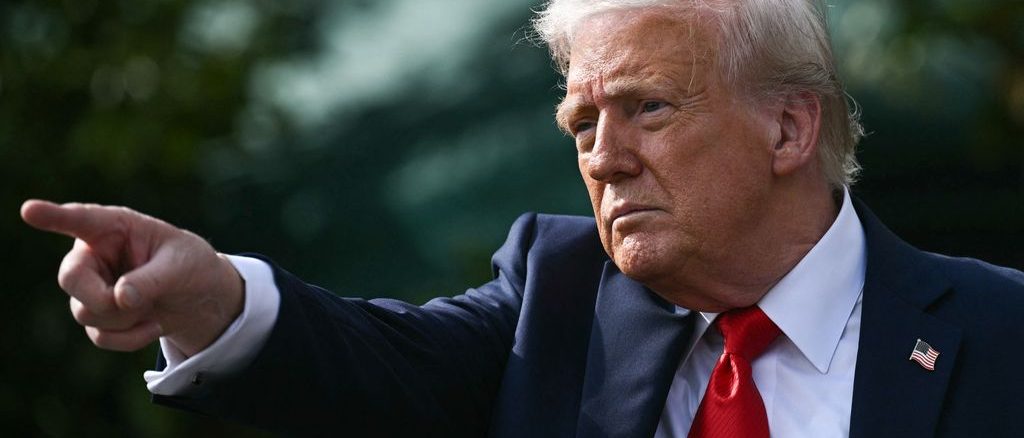
Economists: Trump takes a huge risk with trade war, but can win it
Despite all the criticism, US President Donald Trump can still succeed with the trade deficit of the United States with the rest of the world with the trade deficiency that he was unleashed. But only if he manages to keep his voters calm next year, at a time when the American economy gets a big and perhaps huge thump.
This is apparent from calculations From rabobank economists who have worked out different scenarios. Their maths provide an answer to the question of what Trumps is the end goal. In Europe and China with surprise Watched how the US president lets the economy derail, not only from other countries, but in particular those of the US itself.
In that country, according to Rabobank economy, the economy can cool down considerably this year and next year even by 0.6 percent shrink if the US OP ‘Liberation Day’ announced taxes.
Break
President Trump postponed American import duties by panic on the stock exchange for ninety days, except for China:
Trump over break on import duties: ‘People were a bit scared’
But Trump made an exception for China. In fact, where for the time being for produces from all over the world in the US there is an extra levy of 10 percent, there is 145 percent for a large number of products from China.
More and more economists and financial analysts see the goal that Trump has in mind with his trade war: reducing the trade deficit with China. The US buys much more in China than the other way around and that must be done differently, according to Trump. If Trump sustains his confrontation, the trade deficit with China can be considerably reduced at the end of his current term of office, it can be deduced from the calculations of Rabobank.
That deficiency can even disappear completely if Trump closes deals in the current break of ninety days, so that other trade blocks, such as the European Union, will also burden Chinese products extra. “That dichotomy of the world could be the final goal that Trump has in mind,” concludes Rabo economist Frank van Es.
With this Trump does take a huge risk. “China produces 90 percent of all important earth metals that are needed to make high -quality technological products. The country also makes a lot of electronics,” says Hugo Recognition of Rabobank. “You’ve lost that.”
Safety costs money
In the meantime, prices due to the new Basic Scenario of Rabobank are expected to rise by 6.4 percent this year. Inflation will be 4.9 percent next year. “American importers really do not pay the costs of the taxes themselves. They praise that to American consumers,” expects.
And that is the great risk for Trump. If the US economy is shrinking next year and life has become considerably more expensive, voters can sometimes punish his Republican Party in the interim elections for the congress. Without a majority there, Trump can no longer go his way like now.
The Rabobank economists think that the president dares to dare those risks in his second and final term. “The purpose of this trade war fits in with the ideology of Trump and his government,” Van Es refers to, for example, one Explanation of Stephen Miran, the chairman of the US Council of Economic Advisors.
“Trump and his advisers believe that the US is taking global safety on its shoulders and with the dollar provides a global reserve currency,” Van Es explains. “That safety costs money, and the dollar is quite expensive due to its role. That makes American products more expensive, especially to those from China. The trade deficit with many countries is a direct consequence of this.”
Heavier blows
Everything, according to Rabobank’s economists, points out that Trump wants to resign himself with his trade war as president who solves this problem. And with that the manufacturing industry in its own country is recovering, resulting in jobs.
Nevertheless, it doubts whether that will succeed completely: “The US really cannot make everything itself. And if products have to come from abroad, it is questionable whether consumers will accept higher prices. The price that the US pays for an escalating trade war is really huge. In 2030 the US economy will be nearly 5 billion dollars than” that is. “
In the scenarios in which Europe does not respond directly to Trump’s trade war, the pain in the eurozone seems relatively limited. “We assume that the government will do something by stimulating the economy with investments,” says Van Es. “The growth remains low. And as an export country, the Netherlands will get some more heavier blows than the rest of the eurozone.”
With high import duties, Trump wants to make the trade balance between Europe and the US ‘more fairer’, but that balance is not as unfair as he says.

Be the first to comment